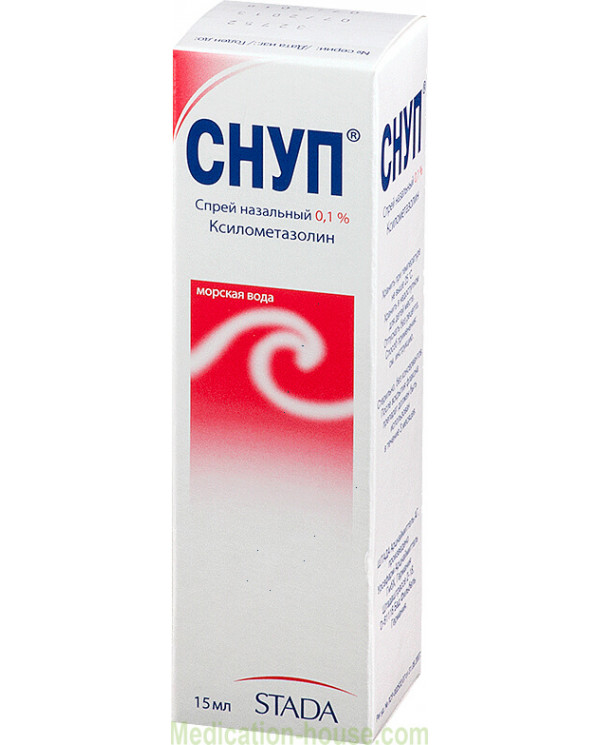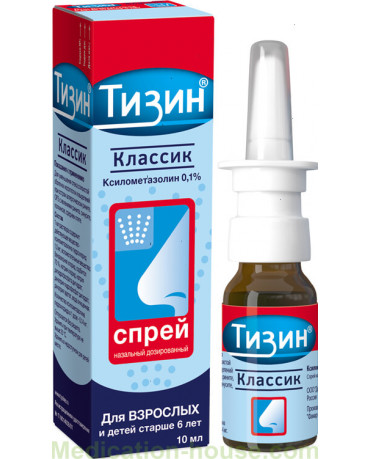Instruction for Snup
You can buy Snup here
Dosage form and biochemical composition
Snup is a nasal spray for irrigation of the nasal mucosa, which includes:
xylometazoline;
potassium dihydroorthophosphate;
isotonic sea water;
purified water.
A solution is produced in 15 ml plastic vials equipped with a convenient dispenser. In a cardboard blue-white or white-red packet contains 1 bottle with decongestant and instructions for use.
Spray Snup is a topical vasoconstrictor drug with alpha-adrenomimetic properties. The xylometazoline hydrochloride contained in it stimulates the anemization (narrowing) of the blood vessels in the nasopharynx. In connection with an increase in the density of the vascular walls, the outflow of intercellular fluid into the surrounding tissues decreases.
Topical anticongestant eliminates puffiness and hyperemia in the nasal passages within 5-7 minutes after spraying, which is confirmed by numerous reviews of patients. Due to this, the secretion of nasal mucus is reduced and breathing through the nose is facilitated. The vasoconstrictor effect lasts for 5-7 hours after using an alpha-adrenostimulator.
Pharmacokinetic properties
Spray Snup is a topical vasoconstrictor drug with alpha-adrenomimetic properties. The xylometazoline hydrochloride contained in it stimulates the anemization (narrowing) of the blood vessels in the nasopharynx. In connection with an increase in the density of the vascular walls, the outflow of intercellular fluid into the surrounding tissues decreases.
In the case of local use of xylometazoline hydrochloride is practically not absorbed into the systemic circulation. The concentrations of the active components in the blood serum are so negligible that they cannot be determined using modern analytical methods.
In case of abuse of Snup spray, undesirable systemic effects from the nervous and cardiovascular systems may occur. Prolonged use of alpha-adrenergic agonist is fraught with addiction, the development of withdrawal syndrome, drug or atrophic rhinitis.
Indications for use
Topical anticongestant is used in palliative therapy of respiratory diseases accompanied by nasopharyngeal edema. Indications for the appointment of a vasoconstrictor spray are:
salpingo-otitis (eustachitis);
neurovegetative rhinitis;
sinusitis;
ethmoiditis;
hay fever;
otitis media;
rhinorrhea;
rhinopharyngitis;
ARVI;
allergic rhinitis;
physiological rhinitis.
A decongestant can be used to reduce swelling of the nasopharynx before conducting physiotherapeutic and diagnostic measures, such as rhinoscopy, irrigation of the nasal cavity, fluid movement along Proetz, etc.
Dosage regimen
The vasoconstrictor spray is intended for intranasal use. The dosage depends on the concentration of xylometazoline hydrochloride in the drug, the age of the patient and the characteristics of the course of the respiratory disease:
children 6-7 years old, 1 spray in each nasal canal of a 0.05% solution no more than 3 times a day;
children from 7 years old and adults, 1 spray in each nasal canal of a 0.1% solution no more than 3 times a day.
With exacerbation of rhinorrhea, the dose is increased to 4 sprays in each nasal passage per day. To prevent dehydration of the nasal mucosa in children, it is recommended to treat the inner surface of the nasal passages with peach oil. According to the instructions, Snup can be used within 5-7 days. Failure to comply with the rules is fraught with the development of atrophic and drug rhinitis, as indicated by the reviews of many patients.
Features of the spray
To achieve maximum effects when using a nasal spray, the following algorithm of actions must be observed:
clean the nasal passages from the accumulated viscous secretion;
remove the protective cap and press the dispenser 2-3 times until the drug suspension appears in the air;
insert the dispenser nozzle 2-3 mm inside the nasal canal so that the bottle is located vertically;
spray the solution with one click on the rim of the dispenser, then breathe in with your nose;
treat the second nasal canal in the same way.
Improper use of the spray can lead to spastic cough and bronchospasm. To prevent complications, while inhaling the smallest drops of the drug, you need to take a slow and shallow breath through the nose.
special instructions
For children under 6 years of age, Snup is prescribed only on the recommendation of a doctor, as decongestants can have a systemic effect on the body. In children, the Eustachian tube is short and wide, so the injection of the drug under pressure can be accompanied by the penetration of the infected nasal exudate into the tympanic cavity. Against the background of decreased body resistance, this can lead to the development of catarrhal otitis media.
Due to the fact that xylometazoline hydrochloride practically does not penetrate into the systemic circulation, the dose of the spray is not reduced with kidney and liver dysfunction. It should be borne in mind that you can use Snup no more than once every 6-7 hours. Overuse of the topical anticongestant leads to the development of withdrawal syndrome, characterized by hyperemia and swelling of the nasopharynx immediately after refusing the drug.
With caution, an alpha-adrenostimulator should be prescribed to people suffering from cardiological pathologies and hypersensitivity to adrenergic drugs. It is recommended to refrain from using a vasoconstrictor spray for prostate hyperplasia, uncontrolled arterial hypertension, thymus hyperactivity and diabetes mellitus.
Gestation and lactation
Snup and its analogues are not used during gestation due to the possible occurrence of a systemic vasoconstrictor effect. An increase in vascular elasticity may be accompanied by an increase in the tone of the myometrium and, as a result, a miscarriage or premature birth.
There is no direct evidence of any adverse effects of xylometazoline hydrochloride in infants. It is not known whether Snup can be excreted in breast milk. In this regard, when using the spray during lactation, it is advisable to stop breastfeeding.
Alcohol compatibility
The instruction is not recommended to use a decongestant in combination with alcohol. Ethanol stimulates the release of hormones by the adrenal glands, resulting in a stress-like effect. With the parallel use of vasoconstrictors, undesirable reactions in the form of tachycardia and respiratory failure may develop.
Drug Interactions
Snup is not compatible with monoamine oxidase inhibitors. Joint administration of the mentioned drugs with an alpha-adrenostimulator may be accompanied by the development of a hypertensive crisis. The parallel use of alpha and beta blockers is fraught with the development of bronchospasm, as well as a critical decrease in blood pressure.
In the case of the use of antidepressants, the vasoconstrictor effect of xylometazoline hydrochloride is enhanced. Subsequently, this can lead to an exacerbation of cardiac symptoms in patients suffering from arterial hypertension and tachycardia.
Overdose
Too frequent use of Snup spray leads to a systemic effect and, as a consequence, such adverse reactions:
excessive sweating;
dizziness;
respiratory depression;
decrease in body temperature;
respiratory failure;
bradycardia.
If an overdose is suspected, symptomatic treatment should be started under the supervision of a doctor. In severe cases, with cardiac arrest, urgent resuscitation is performed.
Side effects
According to patient reviews, when using a topical anticongestant, side effects are rare. Patients may complain of dehydration of the nasopharyngeal mucosa, itchy nose, frequent sneezing, and excessive secretion of nasal mucus. In approximately 1 out of 10 cases, the following pathological symptoms are detected:
nausea and vomiting;
headache;
increase in blood pressure;
violation of sleep and wakefulness;
depressive state;
tachycardia;
violation of accommodation;
heart rhythm disturbance.
The above effects often occur due to prolonged use of a nasal spray in high doses.
Contraindications
Snup is not prescribed for hypersensitivity to xylometazoline hydrochloride. Absolute contraindications to the use of decongestants are:
severe atherosclerosis;
brain surgery;
age up to 2 years;
atrophic runny nose;
thyrotoxicosis;
uncontrolled arterial hypertension;
heart rhythm disturbance.
With extreme caution, an alpha-adrenergic agonist is used for angina pectoris and insulin-dependent diabetes mellitus. Children under 7 years of age may be prescribed a spray in which the concentration of xylometazoline hydrochloride does not exceed 0.05%.
Storage conditions
The spray is stored at room temperature for 5 years. After opening the vial, a decongestant should be used for 12 months.
Terms of sell
You don't need a prescription from a doctor to buy Snup.


